Day of AI: a free AI self-study site created by MIT
Day of AI (Artificial Intelligence Day) was born in June 2021 at MIT. Led by a team of faculty and research scientists from MIT's RAISE (Responsible Artificial Intelligence and Education), the Artificial Intelligence Day program aims to prepare students of all backgrounds and abilities to be successful, responsible, and active participants in an increasingly AI-enabled society.MIT RAISE Team Offers K-12 Teachers a Series of Free Artificial Intelligence Literacy Courses and Teacher Professional Development TrainingThe

Day of AI (Artificial Intelligence Day) far exceeded expectations and had a huge impact.Day of AI was taught in 30 U.S. states and 40 countries in less than a year. By the following year, AI programming courses were offered in schools in all 50 states and over 110 countries, with courses translated into multiple languages and adapted for different regions.The
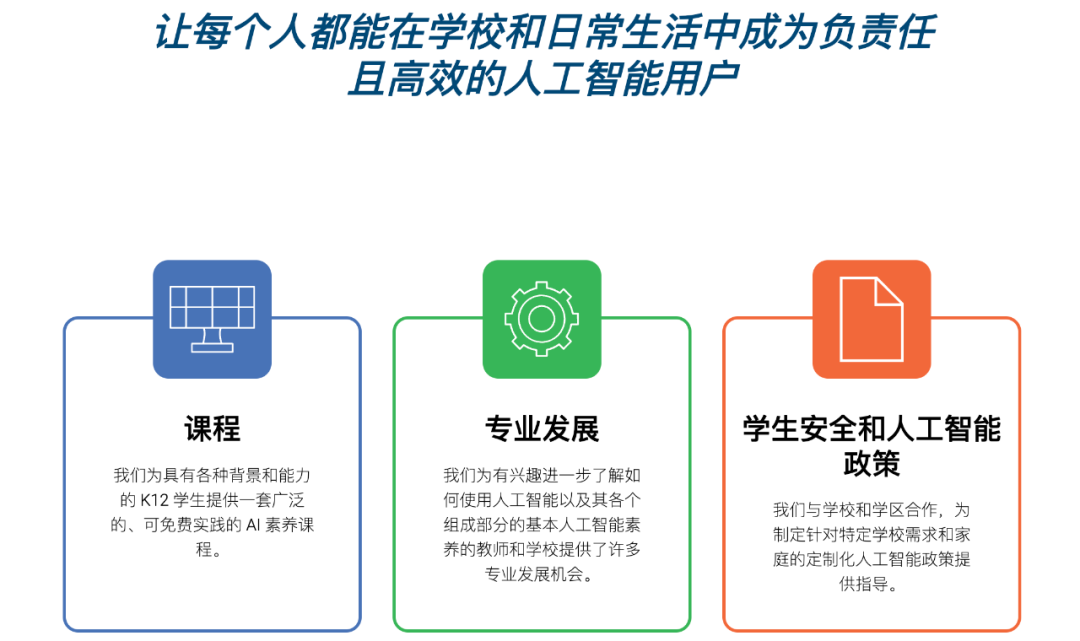
An external evaluation of the program showed that upon completion of the course, theStudents had statistically significant impacts in terms of AI understanding and in terms of their optimism and motivation to use AI to shape their future.. Surveys and interviews conducted after teachers completed the AI Day professional development training consistently showed that theTheir understanding of, satisfaction with, and readiness to teach students about AI literacy are "high" or "very high". These results were consistent across all age groups of students and teachers in all subject areas.
To better meet the dramatic demand for the program, in August 2024, Day of AI was established as a separate non-profit entity based at MIT, continuing to leverage the resources and expertise of MIT's RAISE researchers and scientists, with a team of Day of AI educators, technologists, and trainers who will focus the program onExpanding from basic K12 student AI literacy to supporting teachers in utilizing AI and AI tools in their practice and partnering with school leaders to ensure student safety and equity through the design and implementation of appropriate school AI policiesThe
I. Contributing to the professional development of teachers
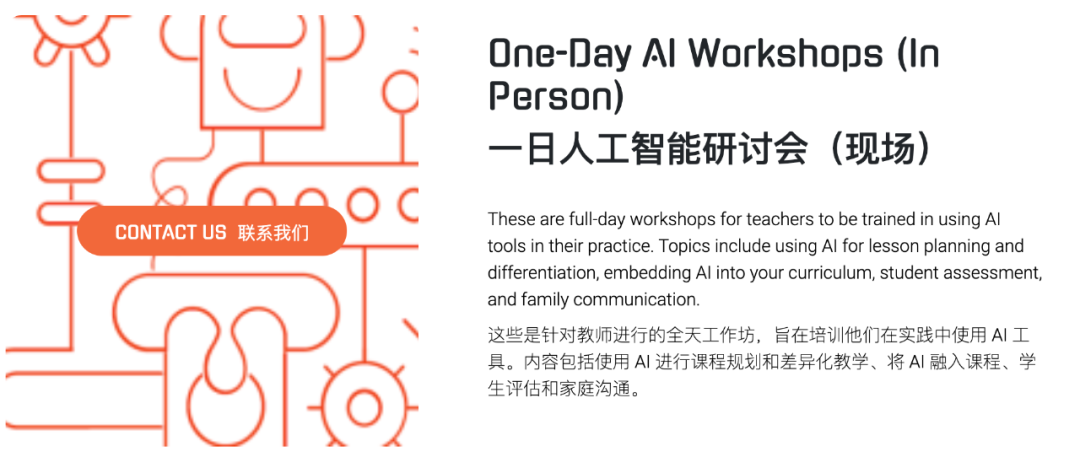
Day of AI TeamProvides teachers with multiple forms of professional learning opportunitiesthat serves schools and school districts interested in basic AI literacy, including administrators, teachers, students, and families. Online and offline one-day, three-day, or year-round workshops are available, as well as courses that are free and offer certificates.

In the online course, you will learn about generative AI. You will exploreHow to use generative AI tools to assist your teaching practice by saving time on routine tasks, personalizing instruction to meet student needs, and enhancing lessons and activities in innovative waysGemini and ChatGPT are examples of generative AI tools that use conversational prompts; in other words, you make a request to an AI tool and it responds to your request. Throughout the course, you'll discover proven strategies for working with AI tools and practice using them to plan and update lessons, prepare instructional materials, manage classes, and more.
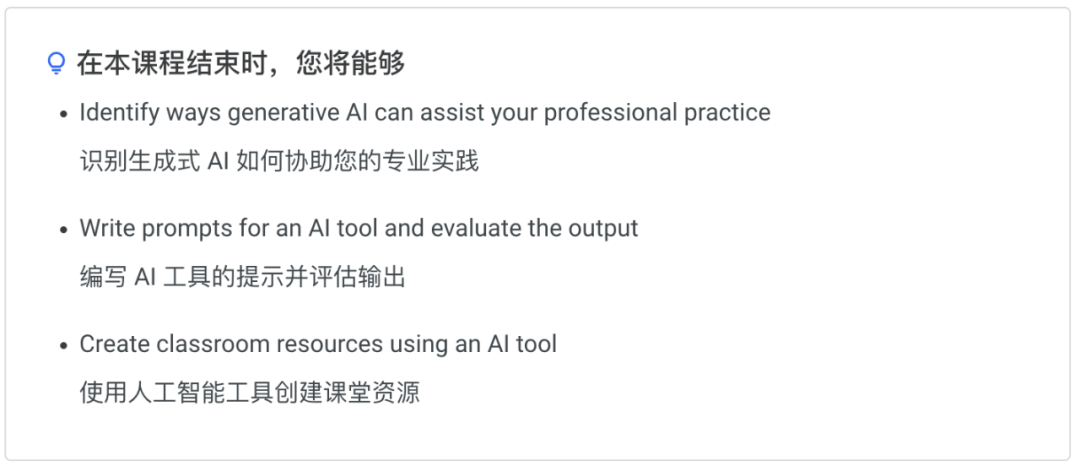
Day of AI also offers professional development opportunities.Help teachers and schools gain insight into how to effectively use AI in teaching and learning and provide students with basic AI literacy education. These programs and trainings are designed to ensure that students are able to use AI technologies safely and responsibly and understand their application in everyday life.
II. Three staple courses for AI literacy
The Day of AI program is designed to help students in grades K-12 understand the basic concepts, applications, and ethical issues associated with AI.The course content is provided free of charge, and educators can access it by simply registering on the website.. The required instructional equipment consists primarily of laptops, Internet connections, and basic classroom materials such as pens, paper, whiteboards, or chalkboards. Some of the course materials do not even require any technological equipment or Internet access.
Notably, Day of AI has also launched new lessons focusing on data science and climate change, which are designed to guide students through the basic concepts of data literacy through the lens of climate change. These lessons are for students ages 8 to 18 and encourage them to deepen their understanding of climate change by observing the natural environment and collecting and analyzing data.
1. Artificial Intelligence Literacy Foundations (AI Literacy Foundations)
Artificial Intelligence Literacy Foundationis Day of AI's core program designed toProvides students with an introduction to the basic concepts and techniques of Artificial Intelligence. Through this course, students will understand the functions and applications of AI and its impact on society. ((Applicable age: 8-18 years)
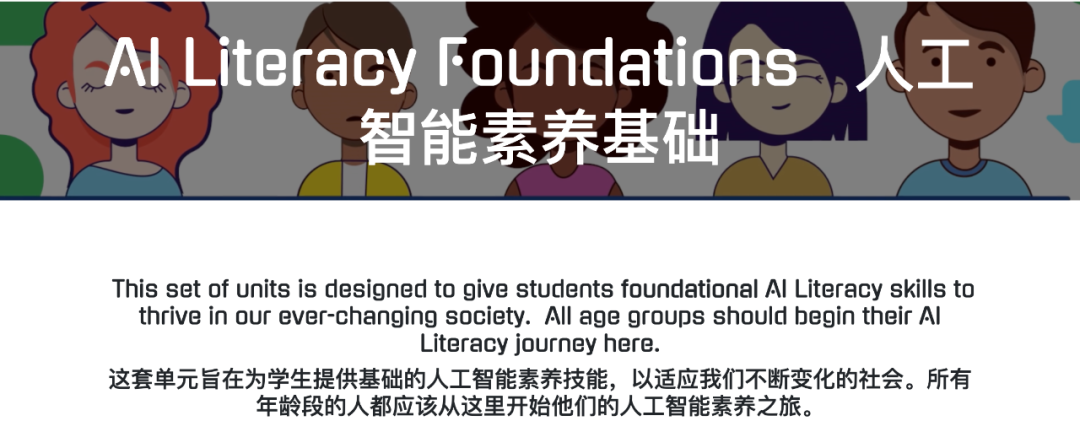
Instructional Objectives:
- Help students develop an initial understanding of AI technology.
- Enhance students' critical thinking skills and independent judgment of technology.
- To stimulate students' interest and enthusiasm for exploring the field of technology, especially AI.
Main Content:
AI Basic Concepts: Introduces the definition of AI and how it works, explores the relationship between AI and machine learning, and understands how AI systems learn and make predictions from data.
AI technology applications: Demonstrate the applications of AI in daily life, such as voice assistants, recommender systems, and image recognition, and use case studies to help students understand how AI can improve their lives and work.
Ethics and social impact: Explore the issue of potential bias in AI and its societal implications, leading students to think about the importance of privacy, algorithmic fairness, and transparency.
hands-on: Provide interactive activities, such as simple programming tasks or experiments that simulate the processing of data by an AI system, to allow students to visualize how AI works.
2. AI Applications (AI Applications)
The AI Applications course focuses on demonstrating multiple scenarios of AI applications in the real world. Through concrete examples and hands-on activities, it helps students understand how AI can impact and improve their daily lives while developing their critical thinking and creativity. (Applicable age: 5-18 years old)
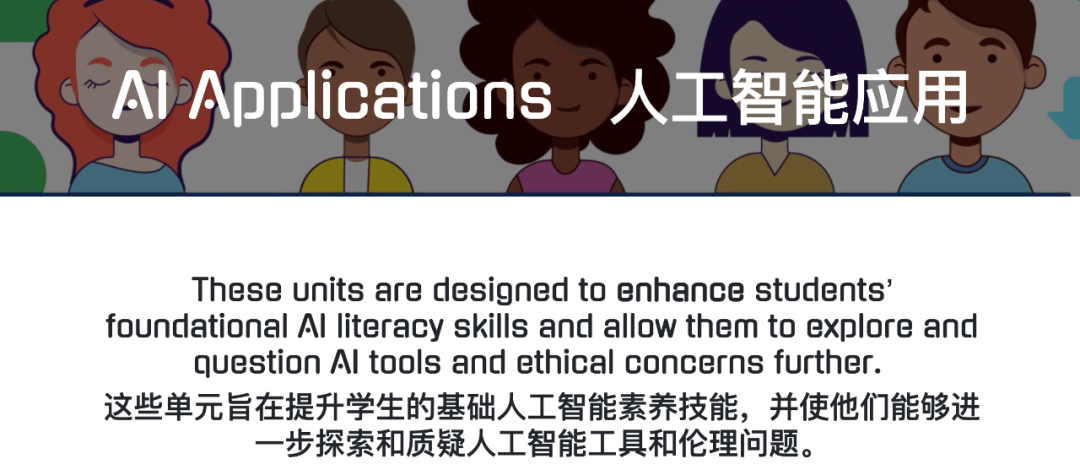
Instructional Objectives:
- To help students recognize the wide range of applications of AI in different fields and its social impact.
- Develop students' interest in AI technology and critical thinking skills.
- Stimulate students to think about AI innovations and applications and encourage them to pursue related fields in the future.
Main Content:
AI applications in everyday life: Explain how voice assistants (e.g., Siri, Alexa), recommender systems (e.g., Netflix, YouTube), and smart homes (e.g., smart thermostats, lighting controls) work and their applications in life.
AI applications in the industry: Explore specific applications of AI in healthcare, finance, education and transportation, such as disease diagnosis, fraud detection, personalized learning platforms and self-driving cars.
The potential and limitations of AI: Analyzing problems and scenarios that AI can solve, exploring the limitations of current AI technology, such as algorithmic bias and incomplete autonomy in decision-making capabilities, and educating students to understand the social responsibility of AI.
Hands-on activities and projects: Hands-on activities that simulate AI applications, such as creating simple recommender systems or data analytics, help students visualize how AI works and reflect on the benefits and potential social issues of AI through group discussions or case studies.
3. Going Beyond AI Literacy (GBAIL)
The Beyond Artificial Intelligence Literacy program aims to deepen students' understanding of AI beyond the basic knowledge level and inspire them to explore technological innovation and social responsibility. The program is designed to be more advanced and suitable for students who have already mastered the basics of AI, helping them to apply what they have learned to complex real-world problems while fostering critical perspectives and creative thinking. (Applicable age: 13-18 years old)

Instructional Objectives:
- Help students gain a deeper understanding of the principles of AI technology and its complex social and ethical issues.
- Lead students to think about how to responsibly design and apply AI systems.
- To develop students' problem-solving skills, creativity and interdisciplinary thinking.
Main Content:
AI's Deeper Exploration: Explore advanced concepts of machine learning and deep learning, understand the fundamentals of neural networks, and gain a deeper understanding of the role of data-driven decision-making in AI systems, as well as the implications and challenges of big data.
AI system design: To guide students through the complete process from problem definition to AI solution development and to develop systems thinking.
The Complex Role of AI in Society: To discuss the ethical, fairness and transparency challenges facing AI technologies and to assess the potential impact of AI on different social groups, particularly in the areas of employment, privacy and social equality.
Policies and regulations: To enable students to understand the regulatory and policy context of AI technologies and to recognize the legal framework for AI development.
Applications and Innovations: Encourage interdisciplinary innovation through project-driven learning where students work in teams to design and develop simple AI models to solve real-world problems, such as environmental protection, health monitoring or educational improvement.
future outlook: An introduction to the direction of cutting-edge AI technologies, such as generative AI and reinforcement learning, and an exploration of AI-related career paths, including research, engineering, and policy development.
Educational activities and practices: Design complex experimental or simulation projects, such as creating data-based prediction systems, and encourage students to come up with and practice their own AI project ideas.
Day of AIThrough three carefully designed staple programs, we provide comprehensive AI education resources for students in grades K-12 to help them master critical skills and develop innovative thinking and social responsibility in an era of rapid technological advancement. Whether you are a beginner or already have a certain foundation, you can find the right learning content for you in these programs.
III. Summary
The Day of AI website is an educational program launched by the Massachusetts Institute of Technology (MIT) and partners toFree educational resources for teachers and students on the basics, application scenarios, and ethical issues of artificial intelligence (AI). It helps students understand how AI is shaping our world and sparks their interest in AI through fun, age-specific lessons designed to help students understand how AI is shaping our world.
this projectFree for educators, provides lesson plans, activities, and hands-on guides to help students master core AI concepts such as machine learning, data privacy, and algorithmic bias while developing their ability to think critically about the societal impacts of AIThe
If you are interested in incorporating AI education into your own teaching or research, Day of AI's resources may be helpful!
© Copyright notes
Article copyright AI Sharing Circle All, please do not reproduce without permission.
Related posts

No comments...




